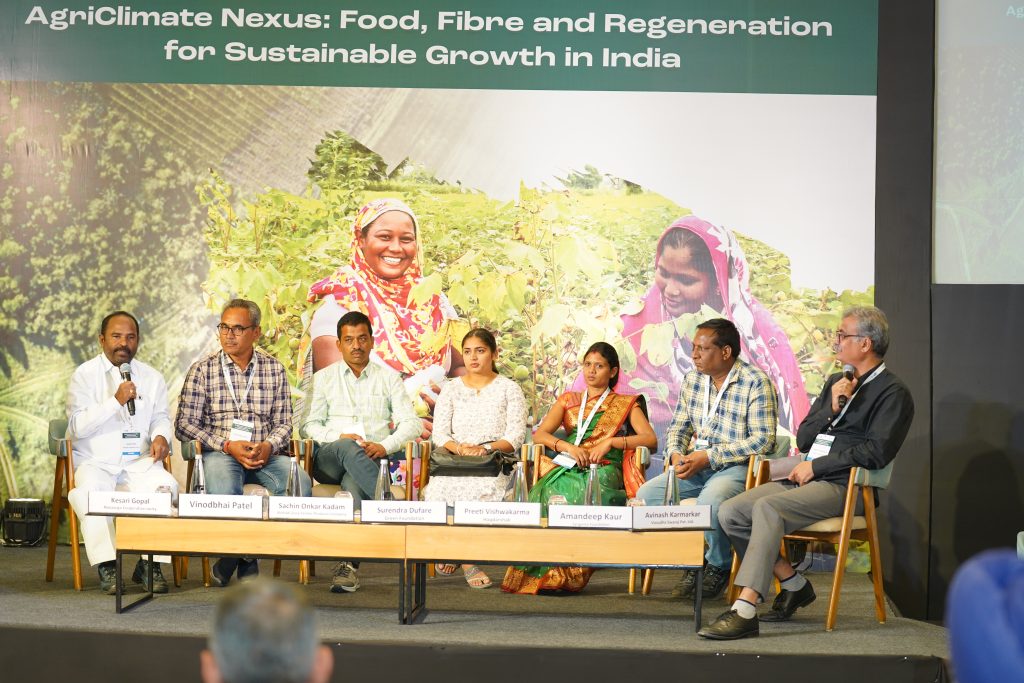
- Farmer organisations, state officials and regulatory authorities support bid to scale regenerative agricultural practices in India.
- Cross-commodity partners to form network to drive collaborative change.
- India’s agricultural sector employs almost half (46%) of the country’s workforce.
Better Cotton and IDH, the Sustainable Trade Initiative, last week hosted an event in New Delhi, India, to build consensus on the scope and merits of regenerative agriculture, as well as to identify opportunities for action across policy, business, finance, and research.
The event – ‘AgriClimate Nexus: Food, Fibre and Regeneration for Sustainable Growth in India’ – brought together participants from farming communities, private sector, civil society and government to collaborate, share insights, and drive meaningful progress towards a sustainable and regenerative agricultural future that would protect the environment and improve the livelihoods of millions of small farming communities involved in the production of food and fibre crops in India.
Discussions at the event explored the scope for cross-commodity collaboration to some of India’s most pressing environmental and socio-economic issues – such as addressing issues of climate change by sequestering carbon in the soil, preventing soil degradation & water scarcity, and the loss of biodiversity, thereby enhancing food security, reducing greenhouse gas emissions and restoring ecosystems.
Jyoti Narain Kapoor, Director of Better Cotton’s India Programme; Saleena Pookunju, Better Cotton’s Capacity Building Manager in India; and Emma Dennis, Better Cotton’s Senior Manager, Global Impact, were amongst those in attendance.
Scaling the use of regenerative agricultural practices will be important to farming communities globally if they’re to ensure their operations are resilient in the face of climate change. This convening will go a long way in strengthening cross-commodity relations and aligning organizations committed to supporting this cause.
Almost one million farmers across India have Better Cotton licences, many of which are smallholders operating on areas of land no bigger than two hectares.
Through this event, we aspire to create a dynamic, multi-sectoral network and mobilize stakeholders towards a more sustainable and regenerative future for agriculture in India. In this, it is paramount that each stakeholder group considers the role they can play to make this a reality.
Better Cotton works from the core idea of regenerative agriculture that farming can give back to, rather than take from, nature and society. Better Cotton’s approach to regenerative agriculture puts a strong emphasis on connections between people and nature, highlighting the two-way dependency between sustainable farming practices and sustainable livelihoods. The scope for regenerative approaches to both reduce emissions and sequester carbon is significant, and of key importance in this approach.
Earlier this year, Better Cotton updated its Principles & Criteria (P&C). The revised standard includes regenerative practices which are relevant in all cotton-growing countries, such as maximising crop diversity, minimising soil disturbance and maximising soil cover.
The organisation is exploring the potential of an additional licence level that would focus on regenerative practices and create both funding and market opportunities. It is identifying suitable partners that can complement these efforts and drive collective change at field-level.
Better Cotton’s 2030 Impact Targets – launched in April – underpin its commitment to action, including a ‘soil health’ goal of ensuring 100% of Better Cotton Farmers improve the health of their soil.
As next steps, IDH and Better Cotton have committed to continuing to engage in cross-commodity multi-stakeholder dialogue on regenerative agriculture, drawing participation from businesses and organisations across the food and fashion industries, as well as other key groups such as government entities, civil society organisations, academia, and the financial sector. A common framework and enabling environment will be crucial in advancing discussions on regenerative agriculture across policy, finance, and industry, and would support Better Cotton’s ambitions to work more with partners on this important area of work.







































